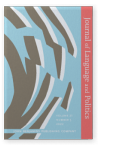Vol. 21:5 (2022) ► pp.653–674
“These are not just slogans”
Assertions of friendship between states
The goal of this study is to capture the meaning of interstate friendship from the perspective of international actors and to underline the benefits of analyzing speech acts as a tool for revealing the relational scripts that guide interstate relations. Analysis of the discourse surrounding 215 assertions of friendship made by statespersons in a variety of diplomatic encounters and cultural contexts allows us to identify the factors that state actors articulate to develop friendly interstate relations, the practices expected from a friendly state, and the goals attributed to practices of friendship. In the Conclusion we discuss the differences between interpersonal and interstate friendships, and how the speech act of friendship plays a part in the construction of interstate relations.
Article outline
- 1.Introduction
- 2.The notion of interpersonal friendship
- 3.Friendship between states
- 4.The discursive construction of interstate friendship
- 5.Data and method
- 6.The perceived facilitating factors, expectations, and goals of interstate friendship
- 6.1Perceived facilitating factors for interstate friendship
- 6.2Expectations from friendly states
- 6.3The goals of practices of friendship
- 7.The meaning of interstate friendship
- Notes
-
References
